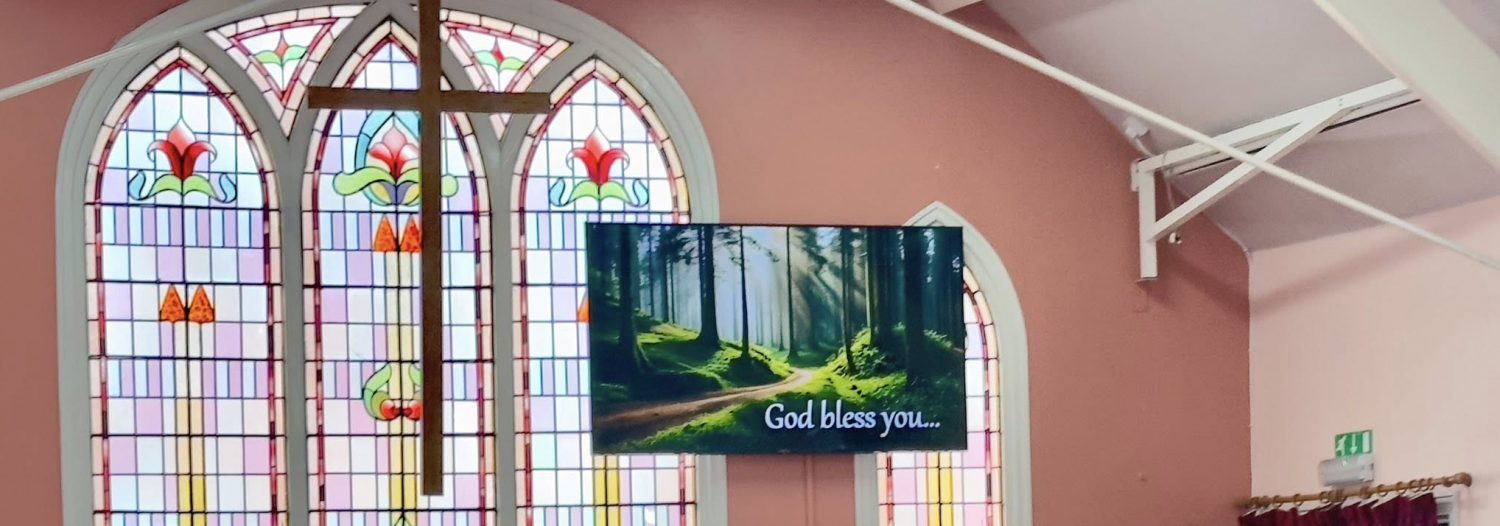Parables of the Kingdom
Sermon for Sunday 18/06/06 @ 10am
Introduction: Our appointed gospel reading for today invites us to look at two parables that Jesus told his disciples on the nature of the Kingdom of God. It is my intention to find out how these parables affect us, and how they might help us to see more clearly where we are going, as a church.
The seed growing secretly: Jesus knew that once his earthly ministry was over, the work of spreading the good news would pass on to the disciples. He was trusting his life’s work to them – there was no plan B. If they failed, everything that Jesus had worked for and given his life for would collapse like a house of cards. He knew that life would be difficult for them. The opposition from Jewish religious leaders and Roman occupiers wouldn’t go away after his death. The disciples and the early church were going to have to deal with apathy and persecution, just as Jesus had.
So Jesus told them parables that they would find helpful when they were facing up to difficulties. They would be able to look back and remind each other of some of the warnings he had given them. These two parables fall into that category.
The first parable likens the Kingdom of God to a seed growing secretly under the ground. Jesus says that just as the farmer, once he has sown the seed, leaves it to nature to produce the harvest – so the disciples must have faith that God will bring about his universal rule. When that time comes there will be an intense period of activity, in the same way that the farmer harvests his crops.
When the early church was going through a bad time – when their fellow-countrymen refused to accept Jesus as their Messiah, when progress seemed to be slow or non-existent, they would remind themselves of Jesus words. They may not be able to see much progress, but the Kingdom of God was still growing and producing new life, just a seed grows underground – out of sight.
The smallest of seeds: The second parable likens the Kingdom of God to the smallest of seeds, a mustard seed that grows into a bush large enough for birds to make their nests in. Jesus is applying the same contrast to his ministry. It may seem to be small and insignificant, but just wait until you see the results!
Again, when the early church felt that the results of their preaching were so small in comparison to the enormity of the task, they would be able to remind themselves of Jesus’ words about the smallness of the seed in contrast to size of the crop.
And so, armed with teaching such as this and the gift of the Holy Spirit, the disciples set about the work that Jesus had commissioned them to do and the early church began to take shape and structure.
Our situation: It does not require a great leap in imagination to see how this teaching applies to our situation today. Just as the early church took strength and comfort from them, so should we. Should we despair at the rapid closure of so many chapels in this area? Should we be concerned that we seem to be witnessing to the love of Christ against a tide of apathy? Should our hearts be broken by the fact that few new Christians are being made in spite of so much hard work. The answer to all these questions is a resounding “No!”
Because the coming of God’s universal rule is in God’s hands, not ours, like the seed growing secretly. Jesus told us to pray for the coming of God’s Kingdom – not to build it ourselves. He told us that God can create great things out of small and unpromising beginnings, like the mustard seed.
So with these thoughts in mind, what evidence should we be looking for in our world today that convinces us that the Kingdom of God is here and growing? We find it in the life of the church, the life of the world and the lives of individuals.
Evidence in the church: It seems to me that in recent history people only turn to the church in large numbers at times of national crisis. The church has always been closer to the New Testament model when working with small numbers. So I see the signs of the Kingdom where there are a few people praying together and sharing with each other how their faith and Christian experience is being worked out in their everyday lives. If people return to the church at a time of crisis in their lives, they must feel that they are welcomed and treated with sensitivity. They must hear the gospel of Christ, and not just from the pulpit but also from routine conversations that take place when worship is over. The church remembers that Jesus came, not to be served but to serve others and the signs of the Kingdom are to be seen wherever the church commits its resources to serving the community in which it is placed.
The church remembers that Jesus placed a child in the centre of his community and invited his followers to make children welcome. Where children are being taught to say their prayers and helped to find their own place within the church we can be sure that the seeds of the Kingdom are still growing secretly.
Since the terrorist attack on the twin towers in 2001, relationships with the Muslim community have taken a battering and an element of fear has built up, largely encouraged by our politicians and media frenzy. In such an atmosphere, it is imperative that the communities get closer to each other and try to understand our different cultures. All over the country, where there are people of different faiths, small groups are getting together to do just that, with the church taking a prominent role. The Kingdom grows from small and seemingly insignificant actions such as these.
Evidence in the World: This weekend marks the 30th anniversary of the Soweto riots in South Africa, when police opened fire and killed a number of young people protesting against the pass laws. It resulted in stepping up the anti-apartheid movement and a world-wide campaign to boycott South African goods. In those dark days it was impossible to imagine the outcome that we see today, with democracy restored and a government that reflects the diversity of the whole nation. Those Christians, like Desmond Tutu, who were in the forefront of the campaign to bring down apartheid were also instrumental in setting up the truth and reconciliation process that followed. They understood that unless those who were once enemies understood each others’ pain, they could not live together in harmony. What has happened in South Africa gives hope to all people living in divided communities – in Northern Ireland, in Palestine and the whole of the Middle East – and is truly evidence that out of death and destruction can come new life. It is, I think, like sharing in Christ’s resurrection, without which the Kingdom of God would have perished.
Evidence in the life of individuals: Finally, I invite you to look for signs of the Kingdom in the lives of individual believers. Two things are self-evident – that where there is a Kingdom there must be a King, and that the whole edifice is built upon the fundamental principle that it is possible for people to change. This is the substance of Paul’s teaching that was read earlier. He spoke about the love of Christ controlling us. This is what it means when Jesus is our king and is allowed to rule over our lives – that all our actions are governed by the values for which Jesus lived and died. Paul speaks of a new creation – that people who are prepared to subject themselves to Christ’s kingly rule are themselves renewed. And I have to say that as I listen to some of the stories that members of this church tell me about the way that their lives have changed, the difference that Jesus has made – then I know that although these are not big stories they are yet another sign of the presence of the Kingdom of God.
Conclusion: I think we should take encouragement from these parables that Jesus gave his disciples. We must try to work out how the church will carry out its mission in these changing times. We do so knowing that however small and insignificant we may think our own contribution to be, God is able to use all that we have to offer to ensure that God’s purposes and promises will one day be fulfilled. AMENby Barry Blunt
© 2006

